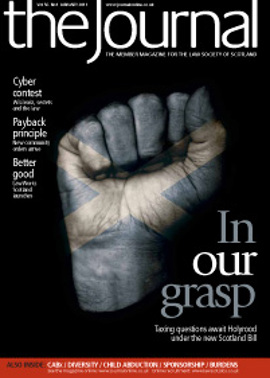Fathers made relevant

Unmarried fathers whose family life with their child might be affected by the decision of a children’s hearing, have a right to be considered a “relevant person” and to be heard accordingly, the UK Supreme Court ruled in a seminal case last month.
In Principal Reporter v K [2010] UKSC 56 (15 December 2010) the court unanimously allowed an appeal by “K”, registered as the father of a child (L, born in 2002), but separated from L’s mother, and held that a sheriff had competently made an order granting K “parental rights and responsibilities to the extent that he becomes a relevant person in the children’s referral”.
K had contested an allegation by L’s mother that he had abused L while exercising contact. K had attended children’s hearings following the sheriff’s order, but when he appealed a condition imposed by the hearing of no contact with L, the Principal Reporter challenged the order in the Court of Session on the ground that it was incompetent. The Lord Ordinary, affirmed by the First Division, suspended the order.
Decisions by the sheriff in relation to children’s hearings are not appealable to the Supreme Court, but the present proceedings being a petition for suspension begun in the Court of Session, appeal was competent. (Ironically, the justices doubted that the petition for suspension was itself competent, as the interlocutor challenged had been allowed to stand for over two years and had been acted on.)
Fundamental issue
Three issues were agreed to arise in the appeal:
- whether the sheriff’s interlocutor was competently pronounced;
- whether s 93(2)(b) of the Children (Scotland) Act 1995, defining persons entitled to participate in a children’s hearing, operated in a manner incompatible with K’s rights under article 6, 8 or 14 of the European Convention;
- if so, whether such incompatibility could be addressed by reading the provision down under s 3 of the Human Rights Act 1998.
At the outset of a single judgment prepared by Lord Hope and Lady Hale, the court noted “a fundamental issue about fairness”, arising from (a) consideration by the children’s hearing and the sheriff, in K’s absence, of the grounds of referral, when those grounds “were based in part on allegations about K’s conduct which, if found to be established, were bound to affect the way L’s case was dealt with from then on”; and (b) the hearing’s decision to deny all contact between K and L, which effectively superseded any contact order made by the sheriff court, but in which K had no right to appear without obtaining an order in separate proceedings. Both aspects struck the court as “quite contrary to one of the fundamental rules of natural justice”.
The First Division had held the sheriff’s order in K’s favour incompetent on the view that the sheriff had failed to address the overarching principles in s 11(7) of the 1995 Act, and thus had acted outwith the powers conferred by the Act. But the Supreme Court held there was “no sound basis” for this view; “In any event, such a failure, while it might be a ground of appeal, would not normally render the order incompetent”. Nor did the sheriff’s failure to refer expressly to the relevant provisions of the Act and to the relevant parental responsibilities and rights have that effect.
Professor Kenneth Norrie of Strathclyde University explained to the Journal that whereas it had been assumed that a s 11 order could not be used to confer relevant person status, the court had held that the sheriff’s interlocutor did not do so “but instead granted the father parental responsibilities and parental rights, and also limited the exercise of these responsibilities and rights: a by-product of the order was to confer relevant person status. As this was competent within the terms of s 11, the interlocutor should stand”.
Facing up to rights
Although K’s arguments under the Convention assumed the incompetency of the order, the court said that as a public authority it had its own duty to act compatibly with the Convention rights. “If we take the view that these have been infringed in the case before us, that duty requires us to say so.”
The first step was to establish that the father and child had a family life together. This was not disputed given K’s previous involvement with L.
Next, it had to be shown that a public authority had interfered with the right to respect for this family life. This too was undisputed. “In case after case”, the justices observed, the Human Rights Court “has found violations of article 8, not because of the substance of the decision taken by the national authorities but because the family were not sufficiently involved in the decision-making process”.
The next question, therefore, was whether that interference was “necessary in a democratic society”. The only justification advanced was that children’s hearings were meant to be informal round-table discussions with only those present who could make a meaningful contribution to the debate. The court agreed that it was important to restrict the numbers involved to those whose participation was necessary. “But it is difficult to see how excluding a father such as this can possibly be proportionate to that aim.”
Further, by not recognising the unmarried father as a relevant person, the 1995 Act imposed an obstacle on such fathers seeking to be heard at children’s hearings, being the necessity to seek and obtain a s 11 order. Such a procedure tended to be much slower than hearings acted, and important long-term decisions might be made before the father had a chance to be heard.
On this aspect Professor Norrie observed: “This is stated in relation to the art 14 discrimination point, and is probably not of general application. So, it may be that a burdensome procedure is compatible with the ECHR if applied to, say, foster carers, or even grandparents with family life. It is not permitted in discriminatory situations: for example for unmarried fathers as opposed to married fathers, or unmarried fathers of children born before 4 May 2006 [commencement of the Family Law (Scotland) Act 2006] as opposed to unmarried fathers of children born after that date.
Going with the grain
In the result, a parent (or other person) whose family life with the child was at risk in the proceedings had to be afforded a proper opportunity to take part in the decision-making process. As currently constituted, the children’s hearing system violated the article 8 rights of K (and indeed of L), and risked violating the rights of others in the same situation. The children’s hearing had to have the best and most accurate information that it could in order to make the best decisions about the child.
That did not mean, the court added, that all unmarried fathers had to have the same rights. “The case law suggests the opposite: that the initial allocation of parental rights and responsibilities to mothers alone can be justified because of the wide variations in the actual relationships between unmarried fathers and their children; but that if an unmarried father has in fact established family life with his child, it is no more justifiable to interfere in that relationship without proper procedural safeguards than it is justifiable to interfere in the relationship between a married father and his child. If this analysis be correct, a complaint under article 14 would succeed if a complaint under article 8 would succeed and would fail if a complaint under article 8 would fail.” No separate issue arose under article 6.
Having considered how to avoid having to make a declaration of incompatibility under article 3, the court proposed the solution in the panel below as going “very much with, rather than against, the grain of the legislation. The aim of the hearing is to enlist the family in trying to find solutions to the problems facing the child. This is simply widening the range of such people who have an established relationship with the child and thus something important to contribute to the hearing. Mostly, these will be unmarried fathers, but occasionally it might include others”.
Initial comment
Morag Driscoll, Director of the Scottish Child Law Centre, described the decision as “good news for children because it should lead to better informed decisions being made about their lives, as unmarried fathers and other people who have established family life with the child can now be involved in the hearing’s discussions. It is also good news for the children’s hearing system because it lifts the cloud of unfairness that has been hanging over its proceedings”.
Professor Norrie commented: “Effectively, this decision renders the definition of ‘relevant person’ in the 1995 Act conterminous with ‘family life’ as defined by the ECHR.” That was relevant to the newly passed Children’s Hearings (Scotland) Bill, which considerably narrows the definition. While those outside the definition can gain the status by going through a new process, the court has held that the automatic imposition of a burdensome procedural hurdle is contrary to article 8.
He added: “The problem is that the new Act cannot be cured in the way the 1995 Act was, because the new definition is far more precise and there is no ‘catch-all’ clause such as the one in the 1995 Act that could have words read down into it. Thus the Government showed foresight in adding at stage 3 a new part to the definition of relevant person: ‘any other person specified by order made by Scottish Ministers’. An order will require to be made before the Act can be brought into force.
“This is hugely important because it renders far less important the debates and disputes about the new process as the bill was going through Parliament. The Government wanted (i) a strict, legalistic, definition of relevant person; and (ii) a new procedure whereby those not within the strict definition can nevertheless be deemed to be relevant persons. It wanted clarity, moderated by discretion. The Supreme Court has said that automatic access to the process must be granted to all those whose family life might be at issue. That new rule cannot be read into the strict definition and Scottish ministers will have to extend it by order. This will reduce very substantially the need to use the new procedure for obtaining relevant person status. That is good: I argued throughout the parliamentary process that we should go back to the 1995 position (as now clarified by the Supreme Court).”
“Relevant person” redefined
Section 93(2)(b) of the Children (Scotland) Act 1995 defines “relevant person” as a person (including a parent) with parental responsibilities or parental rights or who appears to be a person who ordinarily has charge of, or control over, the child. In allowing the appeal, the Supreme Court declared that the definition should be read so as to include the words “or who appears to have established family life with the child with which the decision of a children’s hearing may interfere”.
In this issue
- Prison accommodation for transgender people
- Challenge of the new
- An issue that will not die
- Revolution in the making
- Sasine service
- The welfare imperative
- War on the web
- Payback time
- Diverse means
- Good and better
- Help where it's needed
- Appreciation: Elaine Tyre
- Forum discusses EU contract law
- Law reform update
- Time to take the plunge?
- Ask Ash
- Money talking
- Cut the risk of harm
- Trust rewritten
- Promoting responsibility
- Fathers made relevant
- Tread warily: habitats
- Forum at the frontiers
- Website review
- Book reviews
- Signs of the times






